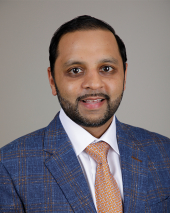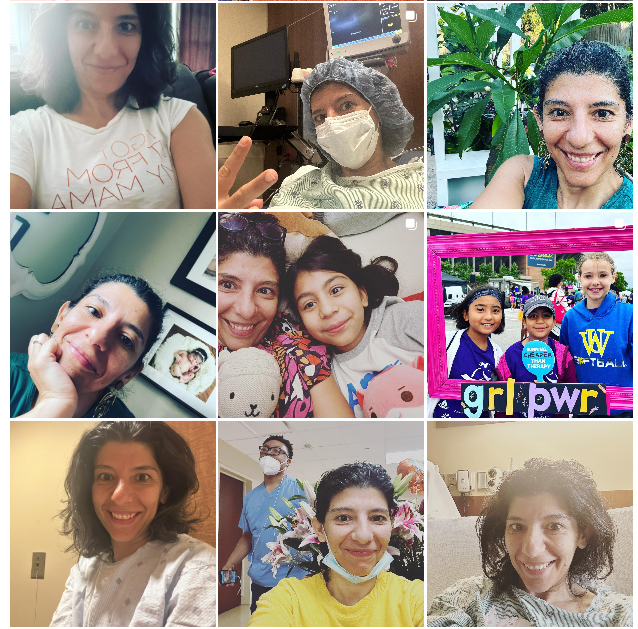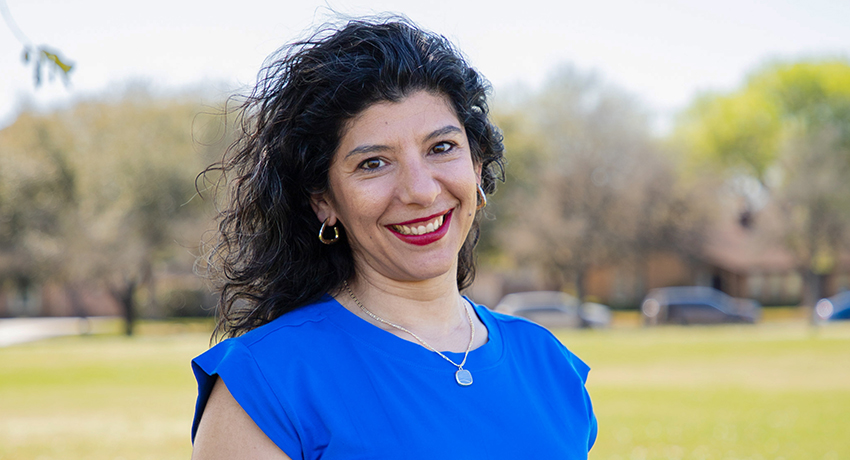A stage 4 colon cancer diagnosis completely shocked Michelle Nasser in 2023 as a 46-year-old mom with two young girls. She purposely changed her habits to keep cancer at bay, after her father’s colon cancer diagnosis at age 59.
“I changed my diet to eat well and did ‘everything’ right,” she said. “I was upset and a little bit in disbelief. I’ve taken steps in my life to not be here. I even asked the doctor if he was sure those were my scans.”
Path to a colon cancer diagnosis
Getting sick on a trip to Mexico was the turning point that sent Michelle to a gastroenterologist. The symptoms she attributed to the trip had lingered for months: vomiting, diarrhea, and gas. She went to Vaibhav Wadhwa, MD, gastroenterologist at UT Physicians Multispecialty – Bellaire Station, for some guidance. He ordered a colonoscopy, which was Michelle’s first at age 46. She thought her first screening would be 10 years before her dad’s age of cancer. But with the recommended age of colon cancer screenings down to 45, Michelle was right at the cusp of the target age.
The results showed a tumor.
Michelle said her tumor was so large, that Wadhwa said it could have been growing for 10 years. Surprisingly, she never felt sick and never had symptoms to indicate a potential concern.
“I had two babies and saw plenty of doctors during those 10 years,” Michelle said. “I never experienced anything that would make me think I might have cancer or a tumor growing. My goal was to take care of it quickly and move on.”
Before Michelle left her colonoscopy, the team had already scheduled her surgery with Amit K. Agarwal, MD, a colorectal surgeon at UT Physicians Colon and Rectal Clinic – Sugar Land. Despite Michelle’s stage 4 disease, Agarwal said he knew with surgery and chemotherapy/immunotherapy that she would do well overall.

“She was doing all the right things, so it was an unfortunate situation for her to get cancer,” said Agarwal, associate professor of surgery at McGovern Medical School at UTHealth Houston. “She did have a family history of cancer, so she was at high risk.”
Agarwal completed a robotic extended right colectomy during Michelle’s surgery and removed the right colon and half of her transverse colon. Fortunately, she didn’t need a colostomy bag.
Pursuing genetic testing
A history of an immediate family member with colorectal cancer or polyps could indicate an inherited increased risk for cancer called Lynch syndrome. Agarwal suggested Michelle pursue genetic testing based on her father’s colon cancer, her age, and the location of her tumor. People with Lynch syndrome have an increased lifetime risk of developing colon cancer, as well as certain other cancers.
Michelle’s screening results came back positive for Lynch syndrome. With this diagnosis and high microsatellite instability (MSI), Michelle was a good candidate for immunotherapy versus chemotherapy. Agarwal said Michelle’s tumor biology suggested that immunotherapy could directly target those genes. He emphasized that she couldn’t have “eaten her way out” of this cancer diagnosis with a healthy diet, because she had a genetic predisposition for it.
Thankful for immunotherapy
Immunotherapy proved powerful for Michelle and has made all the difference in her treatment – in how she feels and in an easier recovery. She has not experienced any sickness from her seven immunotherapy infusions so far, which thrills her. These occur every six weeks. With two young girls at home, she had them in her thoughts as she pursued treatment options.
“When I got diagnosed with cancer, all I could think about was my girls can’t grow up without a mom. And I didn’t want them to see me sick, going through the effects of chemotherapy,” Michelle said. “Once we knew how I was reacting to immunotherapy, we told them about the cancer. They said I looked normal to them, so that’s how we decided to live.”
With Lynch syndrome, Michelle has a higher chance of getting a secondary cancer. Doctors performed a hysterectomy as a precautionary measure, since ovarian cancer is associated with Lynch syndrome.
Despite the concern of getting a secondary cancer, Agarwal said there are ways to stay ahead and not live with fear. The aspects she can control include routine colonoscopies, mammograms, and surveillance imaging with blood work every six months.
Living each day in the moment
Looking back, Michelle believes she “won the cancer lottery” when it comes to her journey with stage 4 colon cancer. It’s a version people don’t emphasize enough.
“When you hear stage 4 metastatic colon cancer, it sounds awful and final,” Michelle said. “But I don’t feel that way, and that’s been a surprising part of the journey.”
Agarwal said cancer is a humbling diagnosis, especially for someone Michelle’s age with small children and a whole life to live. He tries to treat every patient as if they were one of his family members.
“My goal is to be strong, so they can be strong for themselves,” Agarwal said. “Empathy, compassion, and respect will change a patient’s outlook on life and their diagnosis more than you think.”
Empathy, compassion, and respect will change a patient’s outlook on life and their diagnosis more than you think.
Amit K. Agarwal, MD
Michelle said when people think of cancer, they think of this scary thing, but it doesn’t have to be.
“I was trying to live in the moment and celebrate a clear scan, a happy child, and a home-cooked meal,” Michelle said. “Whatever it was, I wanted to stop and see what was in front of me and appreciate it and enjoy it.”
Doctor-patient partnership
Michelle believes Agarwal is the perfect doctor for her. She describes him as kind and very supportive. She believes it’s important to have a doctor who will talk to you and meet you where you are.
“He’s the first doctor to explain things on my level, and his language wasn’t alienating, oversimplified, or overwhelming with too much medical terminology we wouldn’t understand,” Michelle said. “I think that’s a way of showing respect for the patient, and he does that really well.”
Kicking off #TheSmileProject
One of the remarkable aspects of Michelle’s cancer journey is her positive attitude and openness to share her story. And that’s the message she tries to get across to people through her social media posts. She developed a positive attitude toward her cancer journey, no matter what happened.
“I asked friends to smile with me through it, and they did,” Michelle said. “It’s been a really beautiful thing to see people’s reactions.”

Michelle’s husband wasn’t too excited about her sharing her story publicly on social media, but she said that seemed so lonely and sad. She chose to do it for a couple of reasons. First, she believes that pain shared is pain halved, and joy shared is joy doubled. She also wanted to be an example to those who think “it will never happen to me,” as she chose to be careful about her eating and healthy habits. Writing turned out to be a way for Michelle to process and create a community, which she realizes is vital for her and everyone.
“I’m so grateful that I shared because of the ripple effects it’s had. Friends told me that I inspired them to see their doctors and get things tested,” Michelle said. “Others shared their own journeys and told me I inspired them to share their stories, too, and not feel sorry for themselves.”


